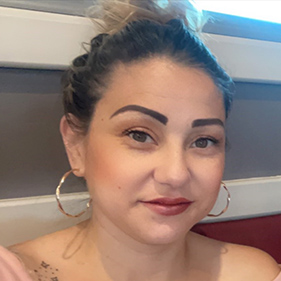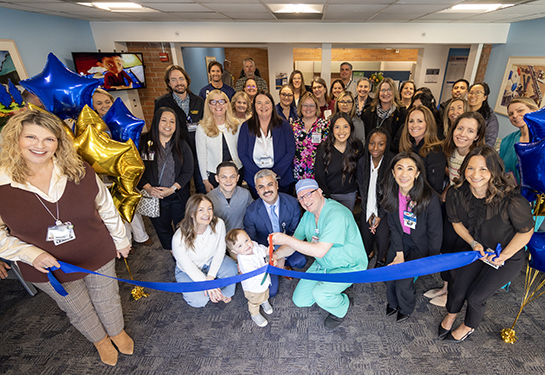On dialysis for 7 years, local teen gets life-changing kidney transplant
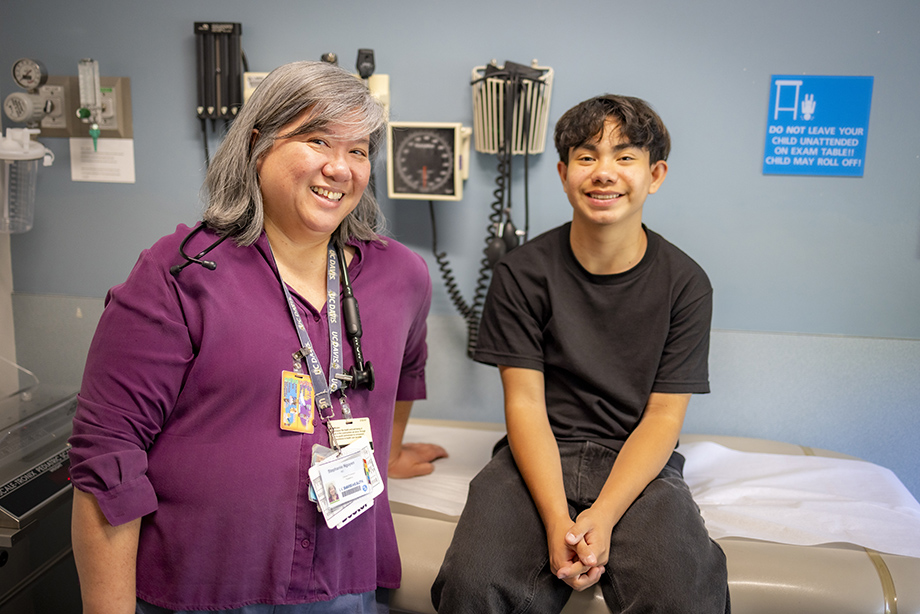
When Justin Ramirez was born, there were no indications that anything was wrong. Although he arrived early at 32 weeks, Justin was otherwise healthy, or so it seemed. Like other preterm babies, he’d have to spend time in the Neonatal Intensive Care Unit (NICU) to grow stronger, but no one knew what was coming next.
Justin’s mother Meliza Ramirez was thrilled to welcome her first boy, her second child. But soon after his September 2009 birth, doctors informed her that Justin was missing a vital organ: a kidney.
They rushed him right away to UC Davis Children’s Hospital from Reno by helicopter. He was four days old.” —Meliza Ramirez, Justin's mom
“When they told me, it was upsetting because my ultrasounds had not shown anything was wrong,” Meliza said. “They said he is likely going to have kidney issues. I was frightened because I had never gone through anything like that.”
This condition, called unilateral renal agenesis, affects 1 in every 1,000 live births, according to the National Kidney Foundation. It is not typically fatal and many people live normal, healthy lives. However, some do develop complications. Justin was one of those people.
“They rushed him right away to UC Davis Children’s Hospital from Reno by helicopter. He was four days old,” Meliza said. “He needed specialized care. That’s when we were first introduced to the hospital.”
The first transplant
A year and a half later, Justin was fortunate to have a kidney transplant at UC Davis Children’s Hospital, which is ranked 23rd in the nation in pediatric nephrology by U.S. News & World Report in 2024-25.
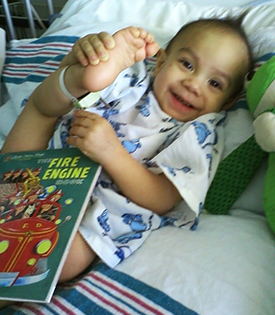
“I was so relieved that we were at UC Davis,” Meliza said. “The staff are really great so I felt comfortable being there.”
The healthy kidney, donated by a family member, was working fine until 7-year-old Justin had a lung infection that led to an induced coma. As a result, his transplanted kidney failed.
“It was upsetting when Dr. Nguyen, his nephrologist, told me he would probably need dialysis because his kidney rejected,” Meliza said. “I was stressed out and really scared.”
Keeping Justin alive
Justin’s condition got worse over the next few months, progressing to Stage 5 chronic kidney disease. Also called end-stage kidney disease, patients may survive a few days or weeks without treatment. Unfortunately, Justin ran out of potential family matches and his name was put on the national kidney registry list, waiting for a call that would come who knows when. This time, dialysis would be Justin’s saving grace.
Doctors placed a peritoneal dialysis (PD) catheter, a soft, flexible tube surgically inserted into the abdomen to allow dialysate fluid (a cleansing solution) to enter and exit for the purpose of performing peritoneal dialysis. This helps filter blood when the kidneys fail. The procedure removes waste products and excess fluids from the blood, effectively acting as a kidney replacement.
The good news was that Justin could do his dialysis at home, thanks to the UC Davis outpatient peritoneal dialysis program. UC Davis Children’s Hospital is the only hospital in inland Northern California to offer outpatient peritoneal dialysis for patients under 10 years of age or 44 pounds.
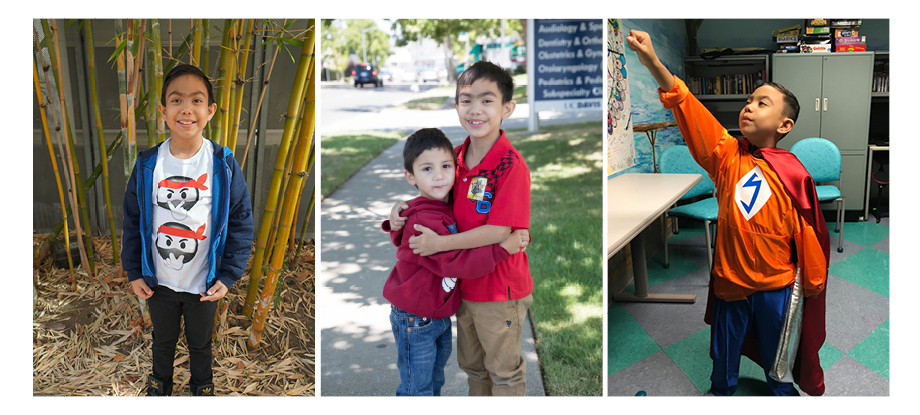
“I was so grateful to UC Davis for making it possible to have dialysis at home so I didn’t have to travel and could be with my kids,” Meliza said. “It was hard being a single parent.”
By March 2018, Justin was on dialysis for 10 hours a day, seven days a week to survive. His childhood had become a series of clinic and hospital visits, not to mention long hours hooked to a machine. Meliza described the time as a difficult one for her growing family.
“It was really hard on all of us. Especially on Justin,” Meliza said. “By this time, I had another son, Uziel, who was little.”
By then, Justin was 8 years old. Several years later, something unexpected happened that gave him the possibility of living a normal life.
A glimmer of hope
It was the middle of the night in the fall of 2023 when Meliza’s phone rang.
“The transplant team from UC Davis called me around 3 a.m. I talked with them and then they sent a text message saying there was a kidney for Justin,” Meliza said. “They told me they’d call me back with details, but I should get Justin out of bed and ready to go.”
She knew it would take a while to drive from the family’s home in Placerville to the Sacramento hospital. The clock was ticking. A kidney was being flown in from out of the area. Twenty minutes later, the phone rang again. Their hopes were dashed.
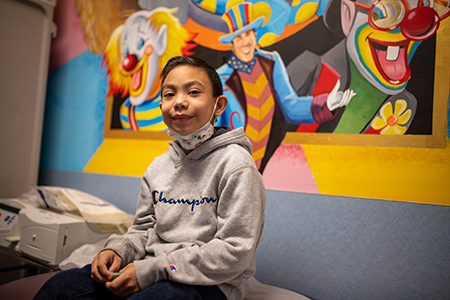
“They told me the kidney was not going to make it in time. The flight was delayed. I was heartbroken,” Meliza said. She told Justin. He was really upset.
Although a huge disappointment, Meliza reassured her son.
“I told him, ‘It’s OK. You’re on dialysis. We can still wait,’” Meliza said. “'It was just not the right time. It is God's will.’”
Meliza continued their arduous daily routine to keep Justin alive. He had nightly dialysis after school. The family relied on their faith to see them through the next few months, as they had during the past seven years.
Awaiting the call
It was now mid 2024 and the fair was in town. Justin, 14, wanted to go.
After dropping the kids off, Meliza got a call from an unknown number. She didn't answer.
“I didn’t recognize the number so I let it ring,” Meliza said. “The phone rang again. I saw it was the hospital operator. I was so glad I answered because there was a kidney transfer offer.”
Meliza immediately went to the fair and got Justin. That was Friday, June 14.
The family went home and waited for transplant instructions. Friday turned to Saturday, and still no news. In the evening, Meliza finally decided to take the kids to get something to eat.
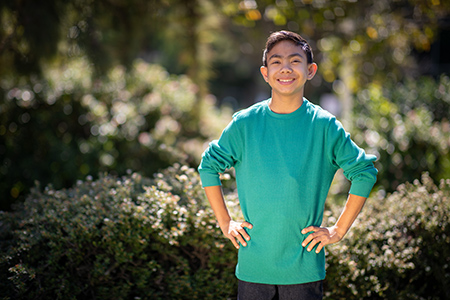
“I told Justin that as soon as we get to the restaurant, they're going to contact us with a time for us to go to the hospital. I just had a feeling,” Meliza said.
And that’s exactly what happened.
The phone rings again
With that call, the clock started ticking … again. They were told to expect instructions shortly. The waiting seemed like an eternity.
At last, they learned the kidney would arrive at 2 a.m. and they needed to be at UC Davis Children’s Hospital by 5 a.m. on Sunday, June 16. Meliza packed up and prepared for the drive.
But then, a delay. The kidney was coming on a plane from Florida and it hadn’t made it to Sacramento. Meliza feared another false start.
“I was so afraid it wasn’t going to be here in time,” Meliza said. “Justin kept asking me if I thought the kidney would make it. We were both so anxious.”
The anticipation was excruciating, but three hours later, the kidney arrived. Justin immediately went into surgery.
A new lease on life
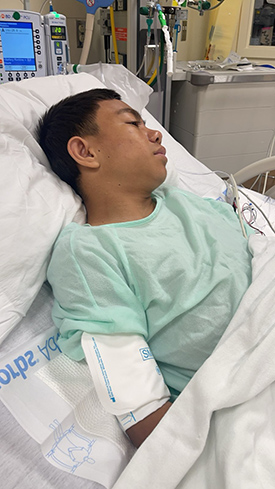
After the four-hour procedure, Justin recovered at the UC Davis Pediatric and Cardiac Intensive Care Unit. Meliza visited every morning then drove back home to tend to her youngest child.
“Even though I had to go home to take care of the baby, I was very confident leaving Justin,” Meliza said. “I knew he was going to be treated really well. We love UC Davis.”
During Justin’s recovery, the Ramirez family got a surprise visit from Richard Perez, the chief of transplant surgery -- Justin’s surgeon when he was a baby.
“I didn’t expect him to check on us,” Meliza said. “I was like, ‘Oh my goodness! It’s Dr. Perez. It was so good to see him.’”
Justin was discharged after a week in the hospital. He still had the peritoneal dialysis catheter for temporary dialysis while the new kidney adjusted. After about a month, Justin was able to stop dialysis. That was a banner day for the Ramirez family.
“I’m going to cry just talking about it,” Meliza said. “We went to get his catheter out and we came home. His friend came over and we had a goodbye dialysis party! We grabbed all the dialysis bags and popped them outside in the front yard. His room was finally cleared out. Justin was so happy.”
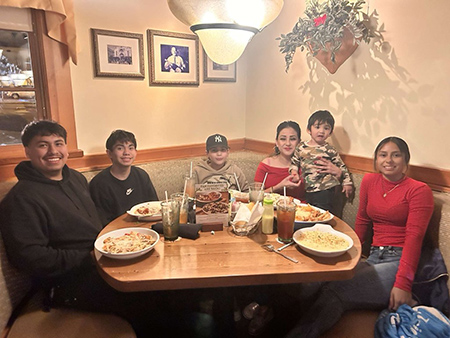
The excitement continued as Justin really realized what this meant.
“He was like, ‘I can't believe that it’s over.’ He was really excited,” Meliza said. “I told him he got a second chance of life and had so much more freedom. He could go anywhere without having to have his machine.”
Looking forward
Justin’s new kidney is expected to last about 10 years. By then he will be 25 years old. He will likely need another transplant, but they are not focusing on that now.
“It’s the one-year anniversary of his transplant surgery on June 16,” Meliza said. “So far, so good. We have had several follow-up appointments and labs and there are no signs of rejection.”
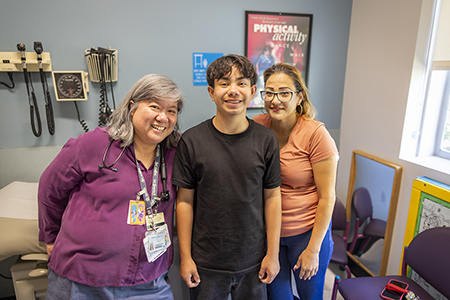
Justin will turn 16 in a few months and he and his mom are excited about what’s to come. He’s a high school sophomore and has a big appetite, something he didn’t have on dialysis. His mom says he has grown up and looks and feels normal again.
“The gift he was given is amazing. It came from God, a selfless family and UC Davis,” Meliza said. “We are so grateful.”
UC Davis Children's Hospital is the Sacramento region's only nationally ranked, comprehensive hospital providing care for infants, children, adolescents and young adults with primary, subspecialty and critical care. It includes the Central Valley's only pediatric emergency department and level I pediatric trauma center, which offers the highest level of care for its critically ill patients, as well as a level I children’s surgery center. The 129-bed children's hospital includes the state-of-the-art 49-bed neonatal and 24-bed pediatric intensive care and pediatric cardiac intensive care units. For more information, visit children.ucdavis.edu.

